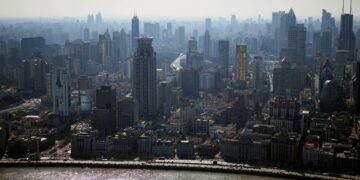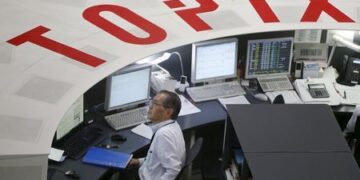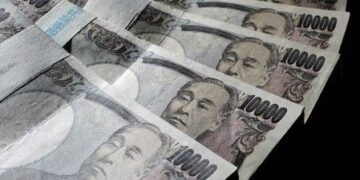By Megumi Fujikawa
TOKYO–The Japanese economy shrank less than initially estimated in the first quarter but remains at risk of technical recession, which could delay the Bank of Japan’s timeline for raising interest rates.
Real gross domestic product contracted 0.2% on an annualized basis in the January-March period, government data showed Monday. That compares with the 0.7% decline in the preliminary estimate. On a quarter-over-quarter basis, Japan’s GDP was nearly flat.
Economists say Japan’s overall economic picture remains unchanged, with weak exports offsetting a recovery in domestic demand.
Private consumption rose 0.1% from the previous quarter, edging up from the initial flat reading, according to the revised figures. Capital expenditure increased 1.1% on the quarter, down from the preliminary 1.4% gain.
While domestic demand added 0.8 percentage point to growth, external demand, or exports minus imports, subtracted 0.8 percentage point from GDP.
“The revised reading doesn’t change the fact that Japan’s economy is struggling,” said Moody’s Analytics economist Stefan Angrick.
“Tariffs and tariff threats are damaging exports and industrial production. Household spending is weak as inflation outpaces wage growth, and pay gains may slow further if tariff pain derails the economy,” he said.
Some Japanese companies have already projected significant profit declines for the current fiscal year ending March 2026, raising concerns about future investments and wage increases.
Economy minister, Ryosei Akazawa, who is leading Japan’s side in trade negotiations with the U.S., has said there is still much to be resolved out at the ministerial level.
In a joint statement, the two countries said that they would “continue to vigorously coordinate to ensure a mutually beneficial agreement,” floating a possible meeting between Prime Minister Shigeru Ishiba and U.S. President Trump in time for the G-7 Summit in June.
Given persistent trade uncertainty and a sluggish recovery in domestic demand, economists say Japan may enter a technical recession, defined as two consecutive quarters of contraction, in the April-June period.
Credit Agricole economist Takuji Aida expects the economy to contract at an annualized rate of 0.4% this quarter, as the boost from production and exports–seen before Trump imposed higher tariffs–fades.
“The BOJ won’t be able to raise interest rates this year, with the earliest possible additional hike likely in January next year,” he said.
Write to Megumi Fujikawa at [email protected]
(END) Dow Jones Newswires
06-08-25 2350ET
















